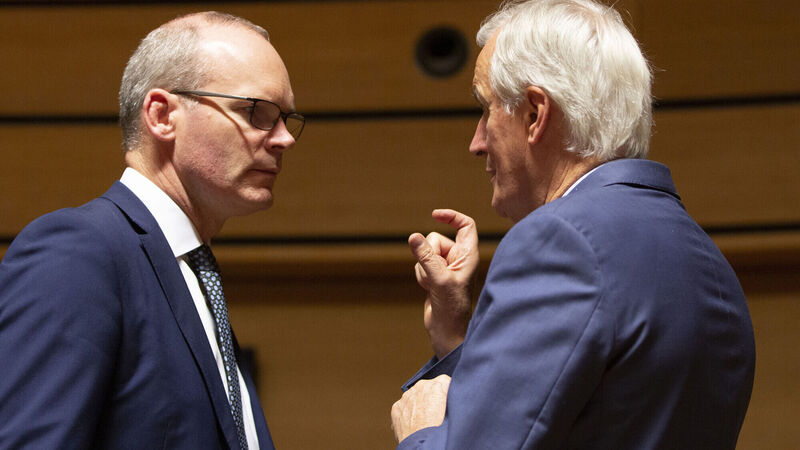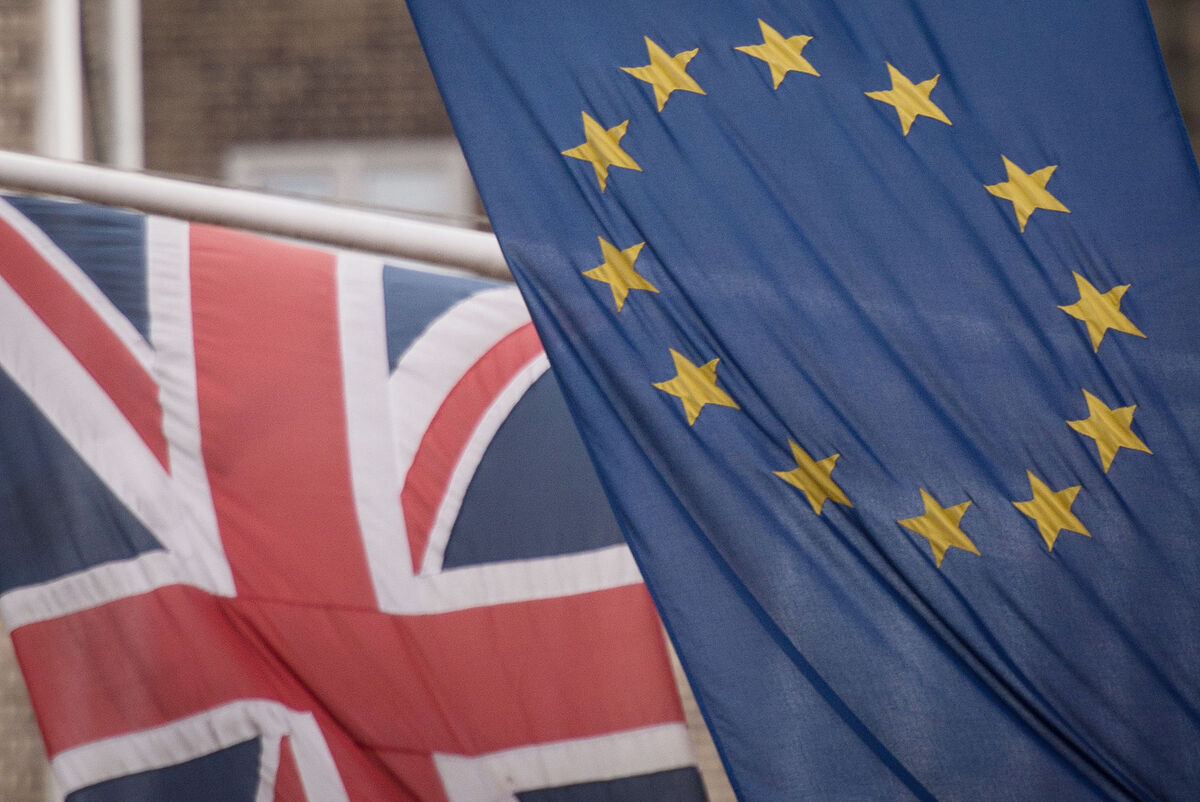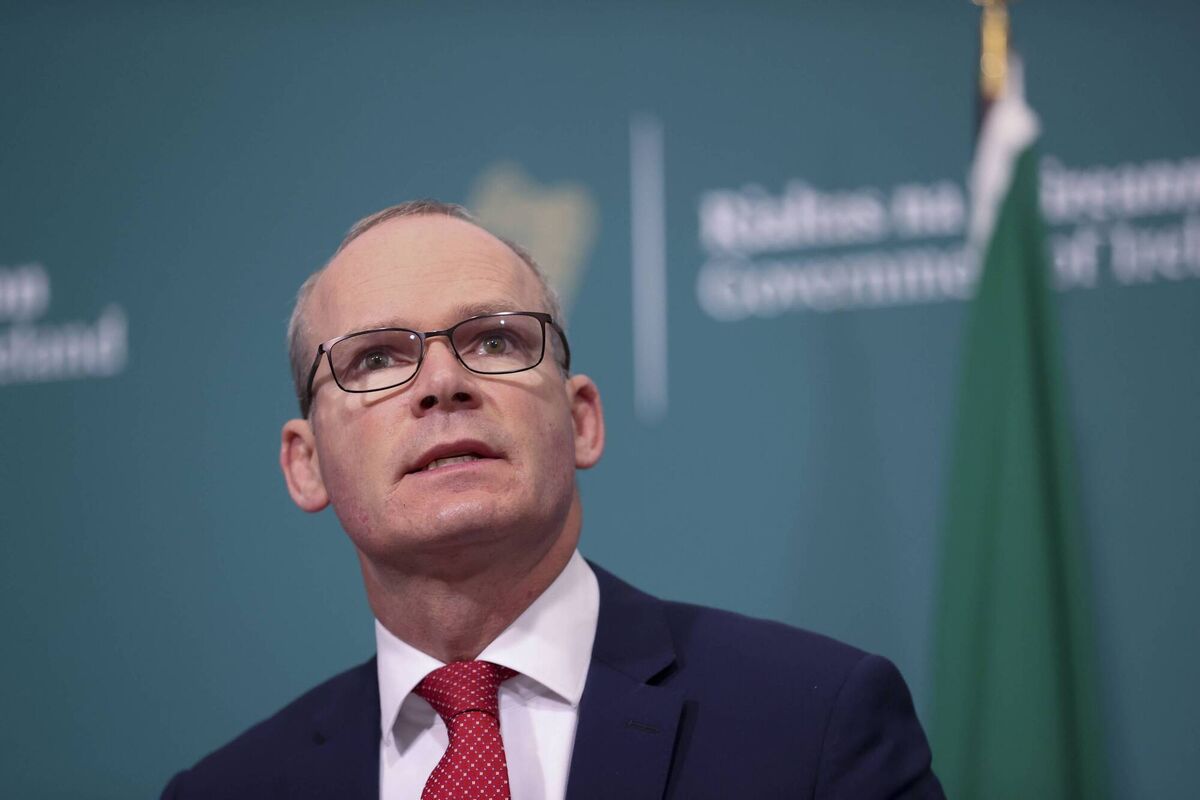Brexit: Deal or no deal, major disruption is coming to our lives

European Union chief Brexit negotiator Michel Barnier, right, speaks with Irish Foreign Minister Simon Coveney (AP Photo/Virginia Mayo)
This week is a 'make or break' week in determining Ireland’s relationship with the United Kingdom.
Foreign Affairs Minister Simon Coveney, in an interview with the Irish Examiner, has set out an alarming picture for Irish businesses and consumers from January 1, whether a Brexit deal is struck or not.
“This week is move week. We have got to find a way of moving this thing forward. We've been stuck on a level playing field and fishing since mid-summer. And we are running out of time. So this week has got to be a week where something changes,” he says.
While Mr Coveney, the Cork South-Central TD says he is slow to put precise dates on when a deal must be reached, he says it's very important that significant progress is made this week.
“Otherwise, I think many across the EU will start to believe that this is not going to happen, and will effectively start to plan for a No Deal or No trade deal. And once that narrative gains traction, then I think a deal becomes less and less likely. So, you know, I believe there will be a deal. But I won't be surprised or shocked if there isn't,” he says.
“After this week, I really think we are into a timeline that makes an already difficult problem even more difficult to resolve. We're effectively in the last 40 days and the ratification process so the pressures around that add to what is already a very complex and difficult challenge,” he says.
Mr Coveney says three main issues remain: creating a level playing field; fisheries; and the controversial moves by the British Government to break international law and tear up the Northern Irish protocol agreed on a year ago.
It is this third issue that has drawn much focus and Mr Coveney delivers a stark warning that unless the UK backs off from its threat, a deal will not be possible.
“If the British government decides to reintroduce the parts of the internal market bill that were taken out by the House of Lords for good reason - because this is essentially the British government threatening to breach international law, to break the withdrawal agreements, and in doing that, changing the protocol on Ireland and Northern Ireland - then in my view, the EU will not ratify a deal,” he warns.
“There is no way the EU will ratify a new agreement if the existing agreement is being breached by Britain deliberately bypassing domestic legislation. Why would they?” he adds.
“In simple terms, and I've spoken to many people across the European Union on this, there's no way they're going to ratify a new deal if the existing deal that's not even 12 months old, is being legislated against by the British Parliament to break international law. That is just not going to happen. So, that's a threat to the ratification process, but we've got to get the deal done first,” he says.

As we were speaking, George Eustace, the UK’s Environment Secretary warned that his government intends to progress the Internal Markets Bill, despite the House of Lords defeat.
Whatever happens, whether a deal is struck or not, Mr Coveney is clear “significant disruption” is coming for Irish businesses and consumers alike.
“Deal or No Deal, in, whatever it is 44 days’ time, the trading environment between Ireland and Britain is going to change very fundamentally,” he warns.
“Businesses really do need to get themselves ready for it. There's going to be no extra time, no extension to the transition period. Legally, the transition period ends at the end of this year and will not and cannot be extended,” he states clearly.
“We're not going to have the kind of seamless trading relationship with and through the UK that everybody has been used to for my lifetime. And that is, unfortunately, the rubber hitting the road on Brexit, because we've really been sheltered from what Brexit means, because of the transition period for 12 months,” he says.
Mr Coveney says in the absence of a deal, tariffs will apply on many products that we sell to and purchase from the UK, which he says could be “very, very damaging” to a number of very important sectors of the Irish economy, particularly in Munster, when it comes to the food industry.
Mr Coveney admits he is “very concerned” about long tailbacks in Britain post-January 1 for trucks seeking to continue to use the land bridge to Europe.
“Yeah, I'm very concerned about that. The British government has tried to be helpful in a legalistic way,” he says.
“But our big problem would be in British ports. Because I don't see a situation if you have a five-kilometre-long queue to get onto ships, I don't believe that anyone is going to wave Irish trucks to the front of the queue. That's just not going to happen,” he adds.

Irish exporters and importers and Irish haulage companies should be talking to each other, should be talking to shipping companies, and should be looking at contingency plans around direct ferry routes, he says.
And there is a lot of extra capacity on our existing direct ferry routes and there are new direct ferry routes that are being announced from Ireland into mainland Europe or the rest of the single market that don't involve any of this disruption, or paperwork or checks by avoiding the land bridge.
He says that if the government has to intervene here, it will do so.
“In other words, this is not about money or cost. At the moment shipping companies are saying to us, there's more than enough capacity in terms of direct links between Ireland and mainland EU that bypasses the UK. In fact, it's only at about 50% capacity right now,” he says.
In relation to fishing, Mr Coveney says there has got to be an agreement on the sector that both sides can agree to but, at the moment, “the two negotiating teams are miles apart on fishing, unfortunately”.
“This is part of the agreement. We're not going to allow fishing to be isolated on its own. And there's give and take from both sides needed to get a deal done here,” Mr Coveney adds.
He said while he is hopeful a deal can be done, he would not be shocked if the process fails.
“I think it would be a catastrophic failure of politics to allow a no-deal to materialise regardless of what causes it. Because the consequences for the British public, the Irish public and others across the EU of a No Deal or No trade deal Brexit is very significant in terms of jobs and livelihoods,” he says.
“So, like I've said for a long time. This is a difficult deal to conclude, but it is very doable,” he adds.





